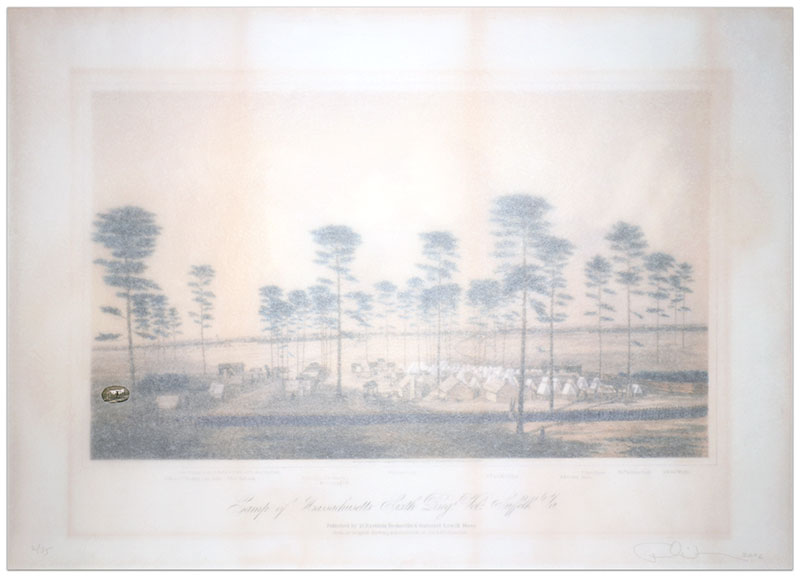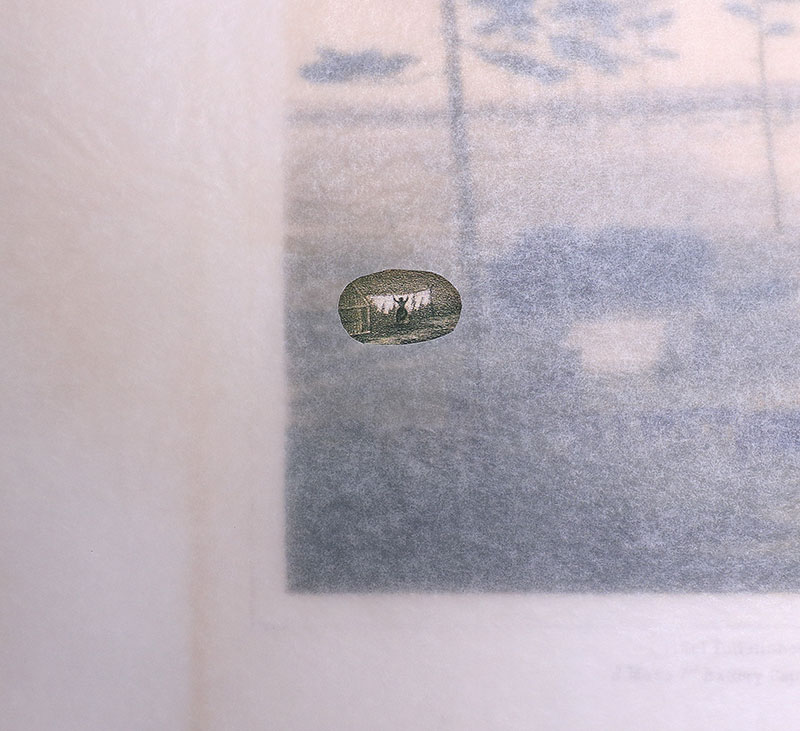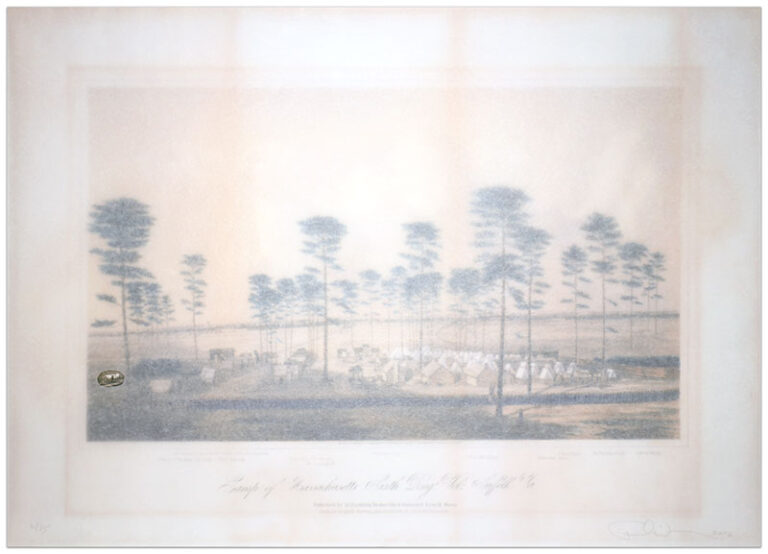


Image/paper size: 19 1/4 x 27 1/8 inches (48.9 x 68.9 cm)
Frame size: 26 1/4 x 34 inches (66.7 x 86.4 cm)
Edition of 35
Signed and dated lower right, numbered lower left in graphite
(Inventory #31821)
For “1863”, Fred Wilson digitally reproduced a lithograph illustrating the encampment of the Sixth Regiment Infantry, Massachusetts Volunteer Militia, in Suffolk, Virginia during the Civil War. The 1863 lithograph was a type made to depict the many camps that were set up for the different regiments. The prints were as created for soldiers and their families at home. The depicted Sixth Regiment was the first unit in the Union Army to suffer fatal casualties during the Civil War. The majority of the regiment’s time in 1863, when not on expeditions, was spent digging trenches and clearing trees in front of the defensive lines around Suffolk. The hard labor had a detrimental effect on the general morale of the Union troops stationed there. This was exacerbated by antagonistic feelings between the civilians of occupied Suffolk and the enlisted men of the Sixth Massachusetts who were fighting to abolish slavery. With all this known, it is even more important to recognize that Wilson’s work consists of not only a digital reproduction of this image, but that Wilson laid a sheet of translucent glassine on top of the reproduction, so as to blur the details. The lower left corner of the glassine contains a cut hole, to allow a viewer to see one specific element of the image underneath: a Black woman at the fringe, hanging up laundry to dry. Through his ‘manipulation’ of the historical image, Wilson reveals, even within a white unit of the Union army who was fighting for the abolition of slavery, the almost invisibility of the laundress, and more pointedly, the invisibility of women and Black people and their work in the history of the Civil War, and ultimately the USA.
Image/paper size: 19 1/4 x 27 1/8 inches (48.9 x 68.9 cm)
Frame size: 26 1/4 x 34 inches (66.7 x 86.4 cm)
Edition of 35
Signed and dated lower right, numbered lower left in graphite
(Inventory #31821)
For “1863”, Fred Wilson digitally reproduced a lithograph illustrating the encampment of the Sixth Regiment Infantry, Massachusetts Volunteer Militia, in Suffolk, Virginia during the Civil War. The 1863 lithograph was a type made to depict the many camps that were set up for the different regiments. The prints were as created for soldiers and their families at home. The depicted Sixth Regiment was the first unit in the Union Army to suffer fatal casualties during the Civil War. The majority of the regiment’s time in 1863, when not on expeditions, was spent digging trenches and clearing trees in front of the defensive lines around Suffolk. The hard labor had a detrimental effect on the general morale of the Union troops stationed there. This was exacerbated by antagonistic feelings between the civilians of occupied Suffolk and the enlisted men of the Sixth Massachusetts who were fighting to abolish slavery. With all this known, it is even more important to recognize that Wilson’s work consists of not only a digital reproduction of this image, but that Wilson laid a sheet of translucent glassine on top of the reproduction, so as to blur the details. The lower left corner of the glassine contains a cut hole, to allow a viewer to see one specific element of the image underneath: a Black woman at the fringe, hanging up laundry to dry. Through his ‘manipulation’ of the historical image, Wilson reveals, even within a white unit of the Union army who was fighting for the abolition of slavery, the almost invisibility of the laundress, and more pointedly, the invisibility of women and Black people and their work in the history of the Civil War, and ultimately the USA.

10 Newbury Street, Boston, Massachusetts 02116
617-262-4490 | info@krakowwitkingallery.com
The gallery is free and open to the public Tuesday – Saturday, 10am – 5:30pm